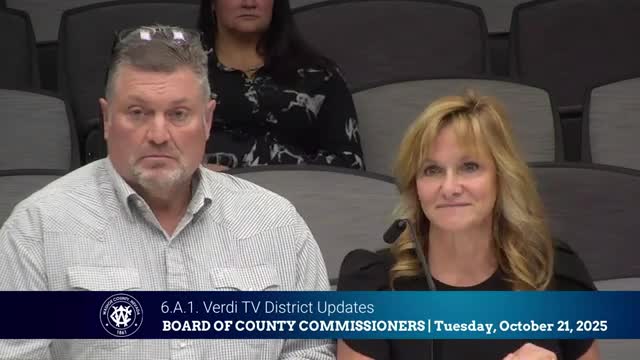RTC report: long‑term maintenance shortfall, electric vehicles erode fuel tax revenue; board hears ITS, traffic management center plans

Summary
The Regional Transportation Commission told the Washoe County Board on Oct. 21 that a consultant study shows about a $1.4 billion shortfall over 10 years to maintain local streets at current service levels, and RTC staff recommended policy options — including an EV registration fee or state action — to replace declining fuel‑tax revenue while advancing an Intelligent Transportation System and a regional traffic management center.
The Regional Transportation Commission presented a year‑end summary and two studies to the Washoe County Board of County Commissioners on Oct. 21, highlighting a major maintenance funding gap, growing electric vehicle adoption and steps to manage traffic through technology rather than continual road widening.
Bill Thomas, RTC executive, said the agency estimates a roughly $1.4 billion shortfall over the next decade for comprehensive roadway maintenance, including snow removal, pothole repair and other local upkeep — a figure that reflects state and local budget limits when localities try to maintain all streets to current standards. Thomas told the board the RTC’s near‑term focus is on prioritization and smarter use of existing capacity.
On electric vehicles, the RTC commissioned the Guinn Center to analyze revenue impacts. Thomas summarized the finding: EVs and hybrids were about 5% of Washoe County’s registered fleet as of June and growing. Lower gasoline consumption — a policy goal for emissions — also reduces fuel‑tax revenue that pays for local roads. Thomas said options discussed included a flat registration fee for EVs, an electric‑charging tax and, longer term, a vehicle‑miles‑traveled (VMT) fee; he said VMT is conceptually fair but faces privacy, technical and administrative barriers and “no state has figured out how to do this yet.”
Thomas said the Guinn Center estimated a midrange equivalent fee at roughly $200–$250 per vehicle annually to replace lost gas tax revenue, and recommended indexing such a fee over time. He framed the issue to commissioners as a policy decision that will likely require state action for many approaches but said local registration fees are among options the county could consider.
For traffic operations, Thomas described an Intelligent Transportation System (ITS) initiative and a planned regional traffic management center that would allow agencies to change signal timing in near‑real time across jurisdictions to address incidents and events more efficiently than repeated corridor widenings. He characterized ITS as a way to get more out of existing pavement: “we can be really smart about how we manage transportation flows,” he said, adding the center would require interjurisdictional coordination among Washoe County, Reno, Sparks and NDOT.
Commissioners asked about prioritization, whether RTC favors particular jurisdictions, and how the county could participate in potential EV fee or registration approaches. Thomas said RTC does prioritization through regional planning documents and five‑year programs, and noted federal funding streams are changing. The board asked to get more detailed revenue estimates and to discuss policy options with state legislators in the coming years.
Ending: Commissioners said housing and other local priorities complicate large tax measures but signaled interest in pursuing policy conversations about EV fees, indexing approaches and ITS as ways to stretch current transportation dollars. RTC will return with further analysis and community outreach plans.

